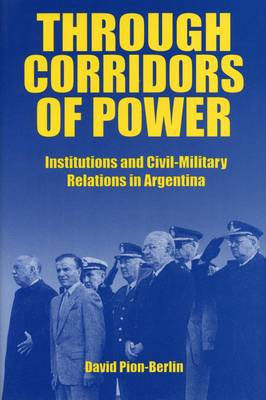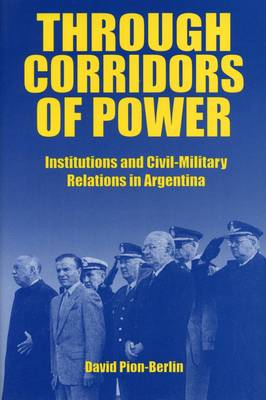
- Afhalen na 1 uur in een winkel met voorraad
- Gratis thuislevering in België vanaf € 30
- Ruim aanbod met 7 miljoen producten
- Afhalen na 1 uur in een winkel met voorraad
- Gratis thuislevering in België vanaf € 30
- Ruim aanbod met 7 miljoen producten
Through Corridors of Power
Institutions and Civil-Military Relations in Argentina
David Pion-BerlinOmschrijving
Military meddling in political affairs has long been common in Latin America, and the recent rebirth of democracy in many countries only heightens concern that military leaders will refuse to submit to civilian authority. One hallmark of progress is the willingness of the military to work through rather than around democratic institutions in Argentina, a country with a long history of militarism. This book examines the influence that institutions have had over the implementation of policy in Argentina between 1983 and 1995, revealing that policies can succeed despite military resistance.
To explain the workings of the new Argentine politics, David Pion-Berlin draws both on archival sources and on interviews with some one hundred civilian and military figures--from presidential advisers and members of Congress to senior officers from all branches of the military--to show how programs are debated by political actors and how authority is dispersed across numerous institutions. Pion-Berlin explains how Argentine democratic institutions mediate the sometimes differing interests of civilian and military authorities in order to determine whether or not soldiers succeed at defeating policies they oppose.
Eschewing conventional approaches that view the military as a domineering power, he shows that the government can either enable or constrain the military's authority and that the success or failure of civilian leaders in imposing their policy on the military is a function of the centralization of policy-making and the insulation of policy makers from external pressures. Case studies of three issues--accountability for human-rights violations, military budgets, and defense reform--exemplify this process.
Specificaties
Betrokkenen
- Auteur(s):
- Uitgeverij:
Inhoud
- Aantal bladzijden:
- 264
- Taal:
- Engels
Eigenschappen
- Productcode (EAN):
- 9780271017068
- Verschijningsdatum:
- 30/09/1997
- Uitvoering:
- Paperback
- Formaat:
- Trade paperback (VS)
- Afmetingen:
- 153 mm x 232 mm
- Gewicht:
- 421 g

Alleen bij Standaard Boekhandel
Beoordelingen
We publiceren alleen reviews die voldoen aan de voorwaarden voor reviews. Bekijk onze voorwaarden voor reviews.











